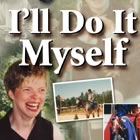A visit from Glenda Watson-Hyatt

Glenda Watson-Hyatt is one of those people that I’ve seen on various accessibility mailing lists over the years but have never met. Glenda is a web accessibility professional, a member of the Guild of Accessible Web Designers, and is dedicated to making the web more accessible for everyone, regardless of their ability.
Glenda has cerebral palsy.
While we still haven’t met, I feel like I know her a little bit better after reading (most of) her book: I’ll do it myself. In celebration of her writing and publishing adventure, Glenda devised an ingenious plan: a virtual book tour. She’s visiting 40 blogs in 40 days, and I’m very pleased to have her visiting here today.
-
You are active in the field of web accessibility – what drew you to work in our field rather than other areas such as physical space accessibility or workplace accommodation?
I actually stumbled across the term and then the field of web accessibility while teaching myself HTML. As I did more reading and learning, I understood that, although using the internet didn't pose insurmountable barriers for me, people with other kinds of disabilities would have problems using it. Although I was (and still am) interested in physical accessibility, I realized that, from a practical perspective, it would be easier for me to assess online accessibility rather than brick-and-mortar accessibility. Yet, I could still advocate for and work toward accessibility for all. Also, I do see web accessibility as a workplace accommodation; all three forms of accessibility are so interconnected.
-
Your book includes your first encounter with a typewriter, and how your therapist immediately suggested a splint with a stick for typing. You quickly went back to your own way – doing it yourself – with your left thumb. Is this still how you type today? Do you use any assistive technology to help you type or work the computer?
Yes, I continue to plunk away at the computer keyboard with only my left thumb; my four fingers glide along the top of the keyboard to steady my unsteady hand. This position is definitely not ergonomically sound and makes the occupational therapists cringe, but hey, it works! Mom and I have often joked that I should insure my left thumb with Lloyd’s of London! I would be so lost without my left thumb! What would I do for a livelihood if I couldn’t type? How would I communicate with the outside world?
The blue Dycem® non-slip mat holds my keyboard relatively still. In place of a mouse, I use a Traxsys (formerly Penny + Giles) joystick. Definitely not an inexpensive alternative at approximately $700 Canadian. OUCH! But I have much better control with the joystick than with the mouse. With the mouse, one involuntary or jerky hand movement and the mouse pointer goes flying across the screen. How frustrating!
I also use EZ Keys software for word prediction and abbreviation expansion, which saves me quite a few keystrokes. Although, even with this handy software, I still only type approximately ten or twelve words a minute, give or take. It also depends on whether or not my Muse is whispering in my ear!
-
We all know that web accessibility for people with disabilities is much, much more than making sites work for screen readers. What parts of using the web are most difficult for you? Can you give us two or three things that we can do to make using sites easier for you?
Yes, it is annoying when web accessibility is seen as an issue mainly for people with sight impairments. Often, it feels like the needs of people with other types of disabilities (and without disabilities per se) are ignored when discussing web accessibility.
With my cerebral palsy, I have an overactive startle reflex; it is simply something that I cannot control. When unexpected music or sound begins once a webpage loads, I nearly jump out of my skin! Unless I can quickly turn down or mute the volume, I hastily hit the Back button, never to return.
Another boobie trap for me are those fly-out menus that require precise mouse movement before they vanish again. Invariably I end up clicking the wrong link and going somewhere that I didn’t want to go. Unfortunately, I cannot tab through those specific menus, which would make navigating those sites less frustrating. Again, I do not stay at those sites longer than I absolutely have to. Similarly, image maps with small clickable areas can require fine hand control. I am grateful when redundant text links are also provided
-
Your most recent adventure (writing your book) is quite an accomplishment. What’s next for Glenda?
Do you mean after I catch up on my sleep? Since my book I’ll Do It Myself began as a dream when I was ten and has taken me thirty years to get to this point, I'm going to do all I can to promote it. My next promotional strategy is to create a Flash movie using childhood photos to put up on YouTube. The challenge with that will be making it truly accessible.
I'm also planning to develop an e-course “Accessibility in Action”. Over the years, I have found that people have fears when interacting with those with disabilities because they simply don't know what to do and they are too embarrassed to ask. I want to address those fears by providing practical information and a safe place to ask questions. The e-course would include topics like what language to use when referring to people with disabilities, tips for when communicating with people with disabilities, ideas for when choosing a gift for a relative/friend/colleague with a disability, suggestions for how to include a classmate with a disability at your child's birthday party, and many other topics. My goal is to include hands-on and practical information that people can use in everyday life.
Meanwhile, I will wait for the seed of my next big dream to be planted.
Derek, thank you for hosting today’s appearance of my virtual book tour. I appreciate it. I would like to invite your readers to follow the rest of my virtual book tour at www.doitmyselfblog.com.
Thanks so much, Glenda!

Comment by Johan — Mar 23 2007 @ 6:12 pm
["¦] Derek Featherstone conducted an interview with Glenda Watson-Hyatt, accessibility specialist who suffers from cerebral palsy. ["¦] Fadtastic.net